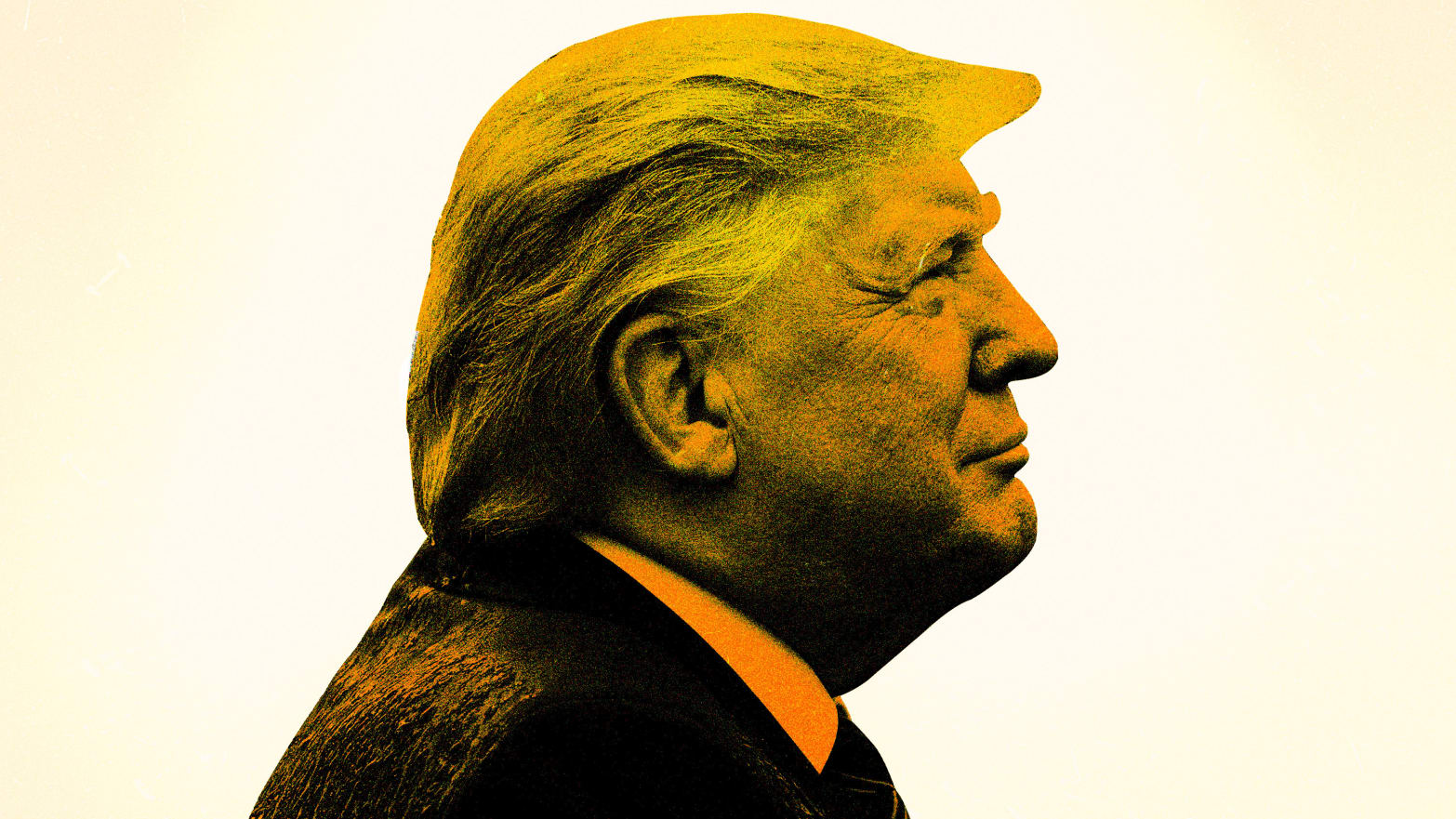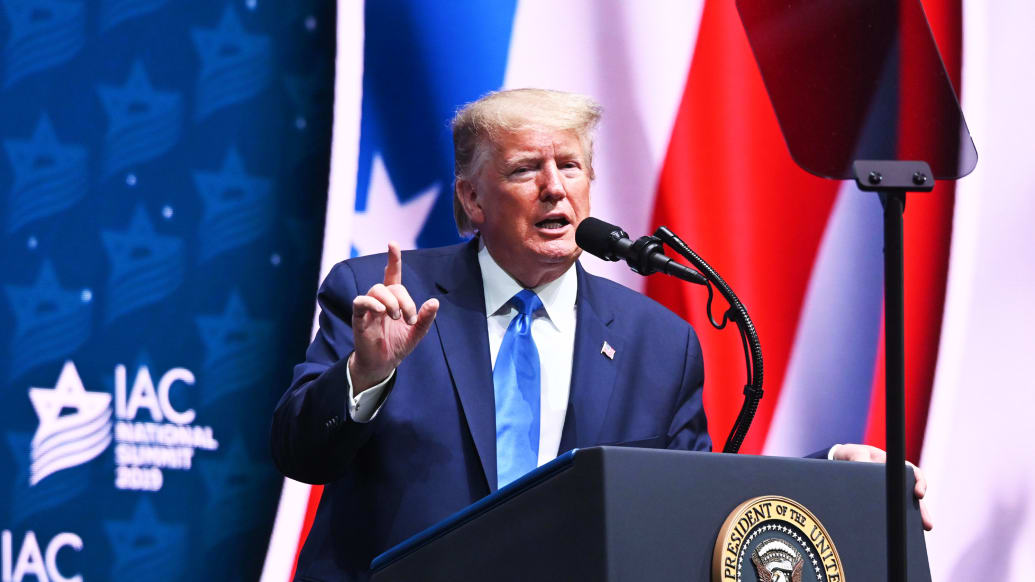Mike "Wompus" Nieznany is a 73-year-old Vietnam veteran who walks with a cane from the combat wounds he received during his service. That disability doesn't keep Nieznany from making a living selling custom motorcycle luggage racks from his home in Gainesville, Georgia. Neither will it slow him down when it's time to visit Washington, D.C.—heavily armed and ready to do his part in overthrowing the U.S. government.
Millions of fellow would-be insurrectionists will be there, too, Nieznany says, "a ticking time-bomb" targeting the Capitol. "There are lots of fully armed people wondering what's happening to this country," he says. "Are we going to let Biden keep destroying it? Or do we need to get rid of him? We're only going to take so much before we fight back." The 2024 election, he adds, may well be the trigger.
Nieznany is no loner. His political comments on the social-media site Quora received 44,000 views in the first two weeks of November and more than 4 million overall. He is one of many rank-and-file Republicans who own guns and in recent months have talked openly of the need to take down—by force if necessary—a federal government they see as illegitimate, overreaching and corrosive to American freedom.
The phenomenon goes well beyond the growth of militias, which have been a feature of American life at least since the Ku Klux Klan rose to power after the Civil War. Groups like the Proud Boys and the Oath Keepers, which took part in the January 6th riot at the Capitol and may have played organizational roles, have grown in membership. Law enforcement has long tracked and often infiltrated these groups. What Nieznany represents is something else entirely: a much larger and more diffuse movement of more-or-less ordinary people, stoked by misinformation, knitted together by social media and well-armed. In 2020, 17 million Americans bought 40 million guns and in 2021 were on track to add another 20 million. If historical trends hold, the buyers will be overwhelmingly white, Republican and southern or rural.
America's massive and mostly Republican gun-rights movement dovetails with a growing belief among many Republicans that the federal government is an illegitimate tyranny that must be overthrown by any means necessary. That combustible formula raises the threat of armed, large-scale attacks around the 2024 presidential election—attacks that could make the January 6 insurrection look like a toothless stunt by comparison. "The idea that people would take up arms against an American election has gone from completely farfetched to something we have to start planning for and preparing for," says University of California, Los Angeles law professor Adam Winkler, an expert on gun policy and constitutional law.

According to the Constitution, Congress and the Supreme Court are supposed to settle those sorts of dueling claims. Given the growing intensity and polarization of political life, would either side accept a decision that handed a contested 2024 election result to the other?
Such a decision would more likely bring tens of millions of protesters and counter-protesters into the streets, especially around the U.S. Capitol and possibly many state capitols, plunging the country into chaos. Although many Democrats might be inclined to demonstrate, a larger percentage of Republican protesters would almost certainly be carrying guns. If the Supreme Court ruling, expected in mid-2022, on New York State Rifle & Pistol Association v. Bruen establishes an unrestricted right to carry a gun anywhere in the country, bringing firearms to the Capitol in Washington, D.C. could be perfectly legal. Says Winkler: "The Supreme Court may be close to issuing the ruling that leads to the overthrow of the U.S. government."
If armed violence erupts the 2024 elections, quelling it could fall to the U.S. military, which may be reluctant to take arms against U.S. citizens. In that case, the fate of the nation might well be decided by a simple fact: a big subset of one of the two parties has for years been systemically arming itself for this very reason.
"I hope it's just too crazy to happen here," says Erica De Bruin, an assistant professor of government at Hamilton College, who studies coups around the world. "But it's now in the realm of the plausible."
Enemy at the Gates
Many Republicans are increasingly coming to see themselves less as citizens represented by the federal government, and more as tyrannized victims of that government. More than three-quarters of Republicans reported "low trust" in the federal government in a Grinnell College national poll in October; only a minority of Democrats agreed. From this point of view, peaceful elections will not save the day. More than two out of three Republicans think democracy is under attack, according to the Grinnell poll, which echoes the results of a CNN poll in September. Half as many Democrats say the same.
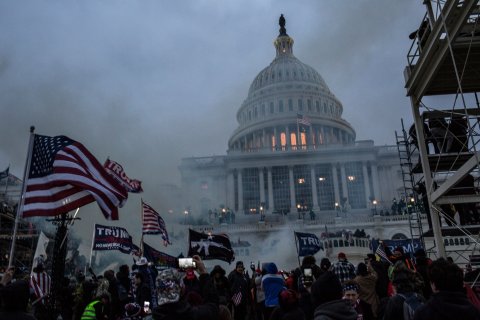
Mainstream news publications are filled with howls of protest over political outrages by Republican leaders, who are reflecting the beliefs of the party mainstream. But the small newspapers in the rural, red-state areas that are the core of the Republican party's rank and file are giving voice to a simpler picture: Politics are dead; it's time to fight. "Wake up America!" reads a September opinion piece excoriating Democrats in The Gaston Gazette, based in Gastonia, N.C. "The enemy is at our gates, God willing it is not too late to turn back the rushing tide of this dark regime." The piece goes on to quote Thomas Paine's exhortation to colonists to take up arms against the British. "We are in a civil war," a letter published in September in The New Mexico Sun likewise warns Republicans, "between the traditional Americans and those who want to impose socialism in this country and thus obtain complete government control of its citizens."
Evidence that a significant portion of Republicans are increasingly likely to resort to violence against the government and political opponents is growing. More than 100 violent threats, many of them death threats, were leveled at poll workers and election officials in battleground states in 2020, according to an investigation by Reuters published in September—all those threat-makers whom Reuters could contact identified as Trump supporters. In October 2020, 13 men were charged with plotting to kidnap Michigan Governor Gretchen Whitmer, a Democrat; all of them were aligned with the political right. Nearly a third of Republicans agree that "true American patriots may have to resort to violence in order to save our country," according to a September poll conducted by the Public Religion Research Institute, a non-partisan group. That's three times as many as the number of Democrats who felt the same way.
Guns are becoming an essential part of the equation. "Americans are increasingly wielding guns in public spaces, roused by persons they politically oppose or public decisions with which they disagree," concludes an August article in the Northwestern University Law Review. Guns were plentiful when hundreds of anti-COVID-precaution protestors gathered at the Michigan State Capitol in May 2020. Some of the armed protesters tried to enter the Capitol chamber.
Those who carry arms to a political protest may in theory have peaceful intentions, but there's plenty of reason to think otherwise. An October study from Everytown for Gun Safety and the Armed Conflict Location and Event Data Project (ACLED) looked at 560 protests involving armed participants over an 18-month period through mid-2021, and found that a sixth of them turned violent, and some involved fatalities.
One indication of how far Republicans may be willing to go in violently opposing the government is their sanguine reaction to the January 6 insurrection at the U.S. Capitol. Republicans by and large see no problem with a mob of hundreds swarming and forcing their way into the seat of American government. Half of Republicans said that the mob was "defending freedom," according to a CBS/YouGov poll taken just after the insurrection. Today two-thirds of Republicans have come to deny that it was an attack at all, according to an October survey by Quinnipiac University. "There's been little accountability for that insurrection," says UCLA's Winkler. "The right-wing rhetoric has only grown worse since then."
Most Republican leaders are circumspect when it comes to supporting violence against the government, but not all. Former Milwaukee County Sheriff David Clarke, a controversial character who remains popular among many Republicans, reportedly told an enthusiastic gathering of Trump supporters in October that if and when a "serious" insurrection springs up, "there's very little you're going to be able to do about it."
Georgia Representative Marjorie Taylor Greene, another prominent Republican popular with the rank and file, opined that the January 6 insurrectionists were simply doing what the Declaration of Independence tells true patriots to do, in that they were trying to "overthrow tyrants." The real threat to democracy, she added, are Black Lives Matter protesters and Democratic "Marxist-communist" agents. Greene and Representative Madison Cawthorn, a Republican from North Carolina, have referred to some of the insurrectionists as "political prisoners."
Trump himself, of course, has nurtured a constant undercurrent of violence among his supporters from the beginning of his first presidential campaign. In 2016 he publicly stated he could shoot someone in the street without losing any of his political support, and he went on to encourage attendees at his rallies to assault protesters and journalists. When demonstrators at a rally in Miami were being dragged away, Trump warned that next time "I'll be a little more violent." At a 2016 rally in Las Vegas, he openly complained to the crowd that security wasn't being rough enough on a protester they were removing. "I'd like to punch him in the face, I'll tell you," he said.
Today Trump openly declares the January 6 rioters to be "great people." In October, he suggested that Republicans might not want to bother to vote in the 2022 or 2024 elections because of their concerns over fraud in the 2020 election. At the same time, he declared that he would achieve an "even more glorious victory in November of 2024." The notion that Republicans could turn their backs on voting booths while sweeping Trump to glory only makes sense if Trump envisions a path to taking power that doesn't require votes.
Republicans approve of that sort of talk. The October Quinnipiac poll found that while 94 percent of Democrats insist Trump is undermining democracy, 85 percent of Republicans say he's protecting it.
Where the Guns Are
In his acclaimed history of the early days of the American Revolution, "The British Are Coming," author Rick Atkinson explains one major reason why America became the first British colony to succeed in winning freedom, where others had failed. "Unlike the Irish and other subjugated peoples," he writes, "the Americans were heavily armed." Muskets, he points out, were "as common as kettles" among the colonists, and American riflemen were among the world's finest marksmen. That possession of and skill with guns, combined with the colonists' deep passion for ridding themselves of what they saw as government tyranny, would help carry the day against otherwise long odds.
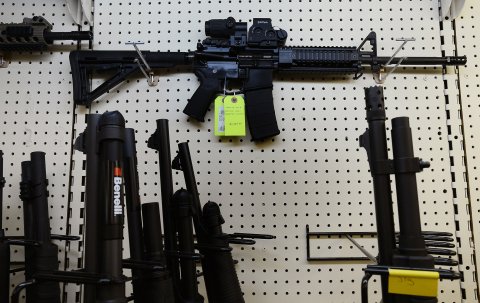
Today the many Republicans who have convinced themselves that they, too, must cast off a tyrannical government have plenty of guns. Americans own about 400 million guns, according to the Switzerland-based Graduate Institute of International and Development Studies in Geneva. (The U.S. government doesn't track gun ownership.) The vast majority of those guns belong to Republicans. Gallup found that half of all Republicans own guns, nearly three times the rate of gun ownership as among Democrats. Gun owners are overwhelmingly male and white and are more likely to live in the rural south than anywhere else. Those demographics mesh neatly with the hard-core segment of the Republican party.
Gun sales have spiked wildly in the past two years. About 17 million people, or more than six percent of the population, bought 40 million guns in 2020 alone, according to research from Harvard and Northeastern Universities. Sales for 2021 are on track to add another 20 million to the total, according to gun-industry research firm Small Arms Analytics & Forecasting.
While there's data to suggest Democrats are stepping up their modest share of the gun-buying, recent history suggests that the great majority of these guns are going to Republicans. According to a 2017 Pew Research Center survey, Republicans and Republican-leaning independents were more than twice as likely to own a gun as their Democratic counterparts.
Former Iowa Representative Steve King, long known as someone unafraid to say out loud what many other Republicans are thinking, is confident that his party is better armed. "Folks keep talking about another civil war," he posted to Facebook in 2019. "One side has about 8 trillion bullets... Wonder who would win?"
Ecstatic Donald Trump Fans Retweeted His Call for "Wild" Protests
The impulse for violent insurrection among Republicans is getting some of its energy from the mostly Republican gun-rights movement, and vice-versa. That's a relatively new phenomenon. The right to own guns was long a passionate cause of conservatives, without ever posing much apparent threat to democracy. But that's changing fast.
In 2000, 60 percent of gun owners cited hunting as the reason they bought guns, according to a Gallup poll. Many of the rest listed "sport," which generally means target shooting. But by 2016, 63 percent were saying they bought guns for self-defense. That shift was brought on by growing paranoia about street crime and mob violence, a fear constantly pumped up on Fox and other right-wing media, which have long been conjuring up the notion that urban gangs and other trouble-makers are increasingly running rampant through suburbs and beyond.
Over the past four years those fears have been blurring into anti-government, pro-Trump, and in some cases white-supremacist movements. "We've seen the flourishing of a different view of gun rights, one that focuses on the necessity of owning guns in order to fight a tyrannical government," says Winkler. "The promotion of that idea has made it all the more likely that some people will come to see the government as a tyrannical one that needs to be overthrown." The resulting gun-rights-driven, anti-deep-state radicalism echoes throughout Republican-heavy social media and other communications channels.
READ MORE
The gun industry didn't create that conflation of gun ownership and an imminent patriotic armed uprising, but it has amplified it. A 2020 article on the website of AZ Big Media, Arizona's largest business-news publisher, advised readers this way: "If you're waiting to buy the firearm you've been eyeing for a while, now is the time. Don't wait until the presidential election. We don't know what's going to happen, but regardless of who is elected into office, the chaos and violence are likely to grow larger."
Palmetto State Armory, a gun-parts manufacturer and gun retailer out of Columbia, South Carolina, puts it this way on their website: "Our mission is to maximize freedom, not our profits. We want to sell as many AR-15 and AK-47 rifles as we can and put them into common use in America today," adding that doing so "safeguards the rights of the people against tyranny." A 2019 Drew University study noted that one out of four of gun manufacturers' most-viewed YouTube videos invoked patriotism. "There's a commercial interest feeding that sense of needing guns to defend against the government," says Risa Brooks, a political scientist at Marquette University.
The National Rifle Association played a big role in pumping up the "own guns to protect America from leftist tyranny" theme. "If the violent left brings their terror to our communities, our neighborhoods, or into our homes, they will be met with the resolve and the strength and the full force of American freedom in the hands of the American people," said NRA CEO Wayne LaPierre in 2017. That same year, an NRA spokesperson railed against Trump's opponents, adding: "The only way we stop this, the only way we save our country and our freedom, is to fight this violence of lies with the clenched fist of truth." There wasn't much question about what that fist would be clenching.
The NRA also put out the notion that gun-control policies enacted by Nazis and aimed at Jews were a critical enabling element of the Holocaust. That claim has been thoroughly debunked by historians, but Ben Carson, Trump's secretary of housing and urban development, publicly tied gun control to the Holocaust. Texas Senator Ted Cruz has also explicitly linked gun rights to fending off federal menace, stating that guns "serve as the ultimate check against governmental tyranny." Trump himself hinted at the darkest of connections between gun ownership and taking down a Democrat-led government, proposing during his first presidential campaign that the "Second Amendment people" might be able to stop Hillary Clinton if she won.
How It Might Go Down
What might lead to large-scale armed threat or even violence around the 2024 elections? There may be only one narrow path to avoiding it: A comfortable, incontestable win by Trump, assuming he's the Republican candidate. Democrats might despair at the loss, but it's not likely that they will go into mass protests against what could be seen as a legitimate election win.
But if Trump loses, by any margin, and is unable to overturn the results through legal or political means, it seems likely Republicans will declare the election fraudulent. In 2020, the conviction—against all evidence—that Trump had the presidency stolen from him brought an insurrectionist mob to the U.S. Capitol. The mob was mostly unarmed, undoubtedly thanks to Washington D.C.'s strict gun-control laws.
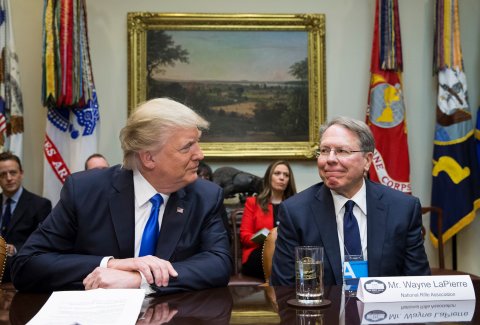
If Trump wins, but by a small margin that Democrats can attribute to Republican laws and tactics aimed at suppressing Democratic votes, massive protests around the country are inevitable. Democrats won't have to stretch their imaginations to make that claim: In 2021, 43 states proposed more than 250 laws limiting voting access. Georgia slashed the number of ballot boxes, a practice almost always aimed at communities with high percentages of minority residents. Iowa closed down most early voting. Arkansas upped the requirement for voter ID. And Utah made it easier to selectively purge voters from its lists.
If Trump loses on votes, but the loss is overturned by the actions of partisan state election officials, legislatures or governors in key battleground states, and that reversal is protected by a Republican Congress or the Supreme Court, protests are again inevitable. And again, that sort of reversal is far from implausible: There are 23 states where Republicans control both the legislature and the governorship, including several of the battleground states. In 2022 Republicans stand to gain control of three more key states—Michigan, Pennsylvania and Wisconsin.
Any state controlled by one party is in a good position to try to overturn an election vote, as Trump and many Republicans urged state officials to do in 2020. "We've seen a trend of Republican governors and legislatures appointing party officials more willing to claim voter fraud, and giving themselves more power to undermine elections at a local level," says Hamilton College's De Bruin. For these and other reasons, America has been steadily dropping on the widely cited Freedom in the World ranking of countries by how democratic they are. The US has fallen from the company of large, Western European countries to end up today alongside Ghana and Mongolia.
Whatever the circumstances that might bring on large-scale protests from Democrats in 2024, their presence in the streets could bring out armed Republican counter-protesters bent on protecting Trump's nominal win and, in their minds, defending democracy against left-wing mobs. "It's a fair concern that If Trump called on them to come out and suppress the mobs, they might respond," says Lindsay Cohn, associate professor of national security affairs at the U.S. Naval War College.
Nieznany, the Vietnam vet, insists that if Democratic protests include any violence, as was the case with several Black Lives Matter protests in 2020 in mostly isolated instances, then right-wing counter-protesters will be justified in shooting. "Rocks, bottles and bricks can kill you as fast as a bullet will," he says. That's the sort of logic that in August 2020 brought Kyle Rittenhouse and his AR-15-style rifle to a Black Lives Matter protest in Kenosha, Wisconsin, where he shot three protesters, killing two, claiming self-defense. A jury acquitted him of all charges.
Based on their actions at protests in recent years, police forces can be counted on for a strong response—against the Democratic protesters, that is. The ACLED found that the police used force in Black Lives Matter protests more than half the time but only a third of the time at right-wing demonstrations. In any case, few police forces are prepared to effectively come to grips with tens of thousands of armed protesters.
Enter the Military
If police can't or won't deal with an armed uprising, the last hope for a peaceful resolution would probably be the National Guard and military. Only the governor can call out the National Guard in a state, and only the president can deploy the military. To send in the military to quell disturbances on U.S. soil, the president must invoke the Insurrection Act, last used in 1992 by then-President George H. W. Bush to help restore order during the Los Angeles riots.
Joe Biden would likely still be president at the initiation of election-related violence, so if the National Guard were unable to quiet things down in one or more states—or if a governor refused to call in the Guard—it would fall squarely on Biden's shoulders to make that call. He wouldn't need any state government cooperation to do it. "It would be an entirely legitimate role for the American military in those circumstances," says Kori Schake, director of foreign and defense policy studies at the American Enterprise Institute.
The National Guard or military would almost certainly prevail in shutting down the worst of the violence and protecting the government. But two key questions arise: Would military leadership accept Biden's orders to deploy against an armed uprising? And if it did, would the rank and file follow their commanders' orders to take up arms against fellow Americans whose motivations might resonate with many of their own?
The military leadership still feels chastened by the outcry after Gen. Mark Milley, the chairman of the Joint Chiefs of Staff, accompanied Trump to a photo op across a Lafayette Square forcibly cleared of peaceful protesters in June 2020, says Brooks. "They're going to be reluctant to get involved," she says. "The military takes an oath to the Constitution, not to a particular president." Biden, too, is likely to see calling in the military as a last resort, she adds. But if the situation is dire, and Biden seems justified in making the call, the leadership will comply, whatever their misgivings, she says.
As for the possibility that the Guard or military rank and file might refuse to follow orders to take up arms against armed Trump supporters, the Naval War College's Cohn deems it unlikely. "There isn't a ton of evidence that the rank and file are solidly behind Trump," she says. "But whatever their beliefs, they're highly professional. No more than a tiny percentage would refuse."
She points out that Trump worked hard to align himself with the rank and file, even while distancing himself from military leadership. And yet there was little sign of overt support from the rank and file when Trump was trying to whip up mobs in January to support his baseless claims of election fraud—even though former Trump National Security Advisor and retired Army General Michael Flynn was at the same time openly calling for the military to take control of the government.
Absent a strong response from some combination of police, National Guard and military, it's easy to see how Republicans would be in a position to essentially take control of the country simply by virtue of their massive arsenal. "Both sides might be equally convinced of the illegitimacy of the other's actions," says Winkler. "What's asymmetric is the capability to inflict violence."
Let's hope it doesn't come to that, and that there's a relatively peaceful resolution to what's likely to be a contentious, hotly disputed election. But that result isn't assured. And even if any conflict ends quietly before it gets too far, experiencing a near-miss might leave our already fragile democracy more weakened and vulnerable. It's hard to say what it would take to repair it.
Nieznany may speak for millions when he insists it's too late. "There are too many of us ready to give our lives to take the country back," he says. "We need a civil war."

